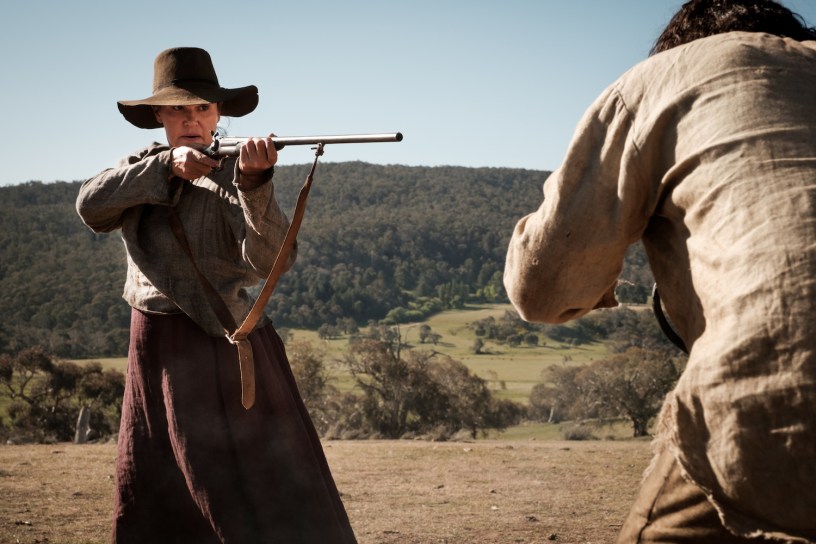This year’s Melbourne International Film Festival (MIFF) promises the Australian premieres of highly anticipated local features such as Leah Purcell’s The Drover’s Wife The Legend of Molly Johnson and Justin Kurzel’s Nitram.
MIFF unveiled the first slate of projects for its 69th iteration today, which sees it return to cinemas, with the full line-up to be announced July 13.
Purcell’s debut feature, which premiered at SXSW, will form the Opening Night Gala – marking the first time a film from an Indigenous female director has opened the event in its history.
“Leah Purcell’s monumental feature The Drover’s Wife The Legend of Molly Johnson will not just open MIFF this year – it will kick the doors in,” said MIFF artistic director Al Cossar.
“This is a film made for MIFF’s return to cinema – an outback western of grand vision; a resonant, revisionist force of filmmaking that has much to say about our country then, and who we are now. The film will lead a slate of extraordinary Australian storytellers – emerging, established, revered – who give momentum and meaning to the core of MIFF this year.”

The 2021 crop will also boast the largest collection of MIFF Premiere Fund films in the festival’s history, including Nitram, the first Australian film scheduled to premiere in competition in Cannes in a decade.
Joining the Kurzel title will be Jonathan Ogilvie’s Lone Wolf, which premiered in Rotterdam, and the world premiere of Aaron Wilson’s Little Tornadoes, co-written by Christo Tsiolkas and starring Mark Leonard Winter.
Other Premiere Fund films include documentaries such as Christopher Amos’ Hating Peter Tatchell; Tiriki Onus’ Ablaze; Adrian Francis’ Paper City; Rhian Skirving and John Harvey’s Off Country; Anna Broinowski’s Uluru and the Magician and Trevor Graham’s Chef Antonio’s Recipes for Revolution.
Music is front and centre in other docs such as Danny Cohen’s portrait of Courtney Barnett, Anonymous Club, and Jonathan Alley’s Love in Bright Landscapes, which focuses on The Triffids and their frontman, David McComb.

Elsewhere in the line-up is the world premiere of Tyson Wade Johnstone’s Levi Miller and Jason Issacs-starrer Streamline, loosely based on the early career of Ian Thorpe (the swimmer is an EP), and Larissa Behrendt’s NRL documentary Araatika: Rise Up!, about Dean Widders’ quest to create a pre-game First Nations ‘unity dance’ worthy of going up against the Maori haka.
Other Aussie docs include Emma Macey-Storch’s Geeta, about an Indian acid attack survivor; Madeleine Martinello’s portrait of furniture mogel Franco Cozzo, Palazzo Di Cozzo and Philippa Bateman’s Archie Roach and Ruby Hunter doc Wash My Soul in the River’s Flow, also bound for Sydney Film Festival.
There will also be an number of local retrospectives, including restored screenings of Rachel Perkins’ Radiance and Margot Nash’s Vacant Possession.
Hear My Eyes, the festival’s event that pairs live music and film, will return to see The Murlocs present a live score to Gregor Jordan’s Two Hands.
The international line-up includes a number of titles fresh from Berlin, Venice and Sundance, including Andrei Konchalovsky’s Venice Special Jury Prize winner Dear Comrades!, Pedro Almodóvar’s The Human Voice, and the Academy Award-nominated Golden Bear Winner Quo Vadis, Aida?, from Jasmila Žbanić.
Given the impact of the pandemic, 2020’s MIFF was online-only. While the slate of films was smaller, the national accessibility of the platform also meant the festival reached its largest audience ever. Thus this year a hybrid element remains, with select titles to stream online across Australia via digital platform MIFFPlay.
The festival will also expand from the Melbourne CBD into five suburban sites and eight regional centres, such as Bendigo, Geelong, and Mildura.
MIFF runs August 5-22. See the full early line-up here.



